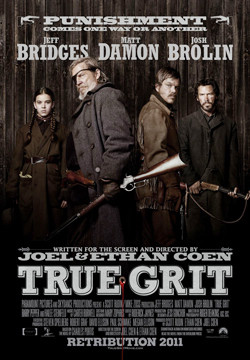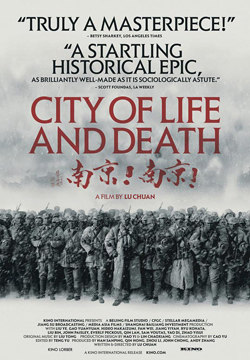|
 |
 |
|
True Grit, directed by Joel Coen |
City of Life and Death, directed by Lu Chuan (FILE) |
"After that, you start building a picture of Iraq based on what you have personally seen and experienced," said Danner.
Lu went through the same process when making the movie City of Life and Death, which he based on the massacre of Chinese civilians by the Japanese army that occurred in Nanjing City in 1937. Lu said he spent two and a half years collecting material, interviewing victims and soldiers before making the movie. "This movie is based on facts for sure and my job is to select bits from all the material I gathered and tell a complete story," said Lu. "All the characters involved in this movie did exist and I tell the audience what happened to them at the end of the movie with subtitles."
Director He Ping, who is better known for making martial arts fiction movies, said that whether a story is based on facts or not is not important for his type of movie. "As long as the audience believes it is rational or reasonable, it is alright," said He. "Even in martial arts or movies which are often pure fiction, people still expect the movie to be rational and authentic, not necessarily the story itself but the emotions involved in it."
"Sometimes, my inspiration comes from reading stories in the newspapers," said He. "If I am touched by a story I read, I will consider involving it in my movies."
He compared making movies to dancing. "The form is actually not that important. Be it ballet or disco or folk dancing, as long as it conveys the right information and can touch the audience, it is good."
Coen still remembers the first movie he made using an old, clunky camera at home. "I think that first film was just as good as what I produced in the studio later. So the tools are not that important to me," he said.
"Tools are not a problem. It is much easier to be a film maker now as many people can afford to purchase the equipment, which is now lighter and easier to move than before," said Lu.
Damian Woetzel, a producer and director of dance and music performances echoed this sentiment. "Everybody who has an iPhone or similar device is making films. I notice that in many cases—it seems people are not experiencing something unless they are recording in some way," said Woetzel.
"My kids can even edit movies using an Apple computer. I think it's great that every body has the chance to gain access to this industry. But not everybody with a pen can be a writer, and the same applies to movies," said Coen. "Creativity and content are always the most important things."
"The threshold for entering this industry is getting lower and lower, but that doesn't mean making movies is getting easier and easier. I sometimes hear young directors talking about becoming top-class directors as if that were not a difficult thing to achieve. In my opinion, this is actually making the industry even more difficult to succeed as there is now so much competition," said Lu.
However, one thing that seems assured is the industry's bright future.
Lu said that 10 years ago, almost all the movies in China were sponsored by big state-owned film companies. Since 2000, however, private companies have come to dominate the industry and invested in many movies with good box office returns. For Lu's movie City of Life and Death, the investment came from state-owned companies as well as private companies, from both the mainland and Hong Kong.
Cooperation between directors from China and abroad has also increased over the past few years.
In 2009, Chinese director Zhang Yimou made a movie A Simple Noodle Story, a revised version of the Coen Brothers' movie Blood Simple. "It was an interesting experience watching the Chinese version of Blood Simple. Maybe in the future I will make an American version of Zhang's movie Red Sorghum," said Coen. | 